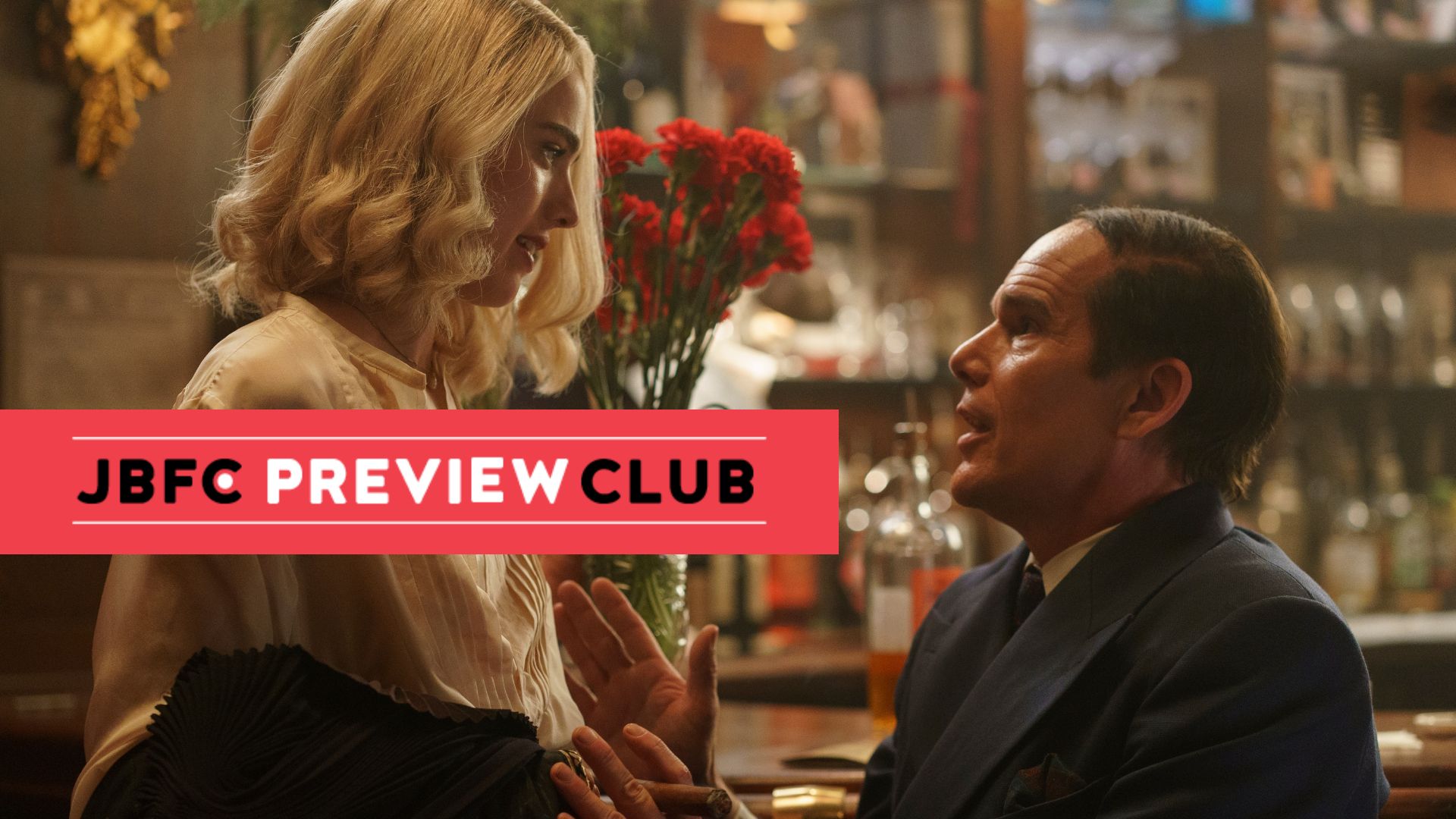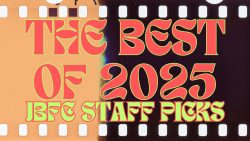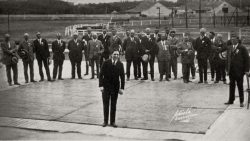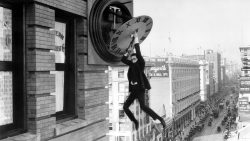Posted October 15, 2025
Blue Moon: Preview Club Wrap-Up
As part of the JBFC Preview Club, subscribers get an exclusive first look at the most interesting new indies and foreign films on our “New Releases” horizon. Every month, JBFC programmers present a special “secret” screening of an anticipated new film release before it is available to the public.
After the screening, our programmers open the floor for a robust audience discussion and send Club members a wrap-up note with behind-the-scenes details and fun facts about the film they just watched. As a special treat, we have decided to make these notes public.
Preview Club Wrap-up for Blue Moon, presented by JBFC Programming Coordinator Ian LoCascio on Oct. 7:
Hi all,
Thank you for joining me for another wonderful Preview Club screening on Tuesday evening! As a reminder, this month’s Preview Club film was Blue Moon, which will open for a full run at the Burns on October 24, courtesy of our friends at Sony Pictures Classics.
Blue Moon was directed by the great Richard Linklater, and had its world premiere in competition at the Berlin International Film Festival earlier this year, where Andrew Scott won the Silver Bear award for Best Supporting Performance for his role as Richard Rodgers. Since its premiere, the film has gone on to play at other stops along the festival circuit, including the Toronto International Film Festival and the New York Film Festival.
Across his nearly four-decade-long career, there have been a number of recurring themes, interests, and preoccupations which have formed different throughlines in Richard Linklater’s body of work. No theme feels quite as central to the cinema of Linklater, though, as that of “the passage of time,” something which plays an especially prominent role in Blue Moon.
Linklater’s interest in time has manifested itself in especially tangible ways across some of his most acclaimed films. His film Boyhood was famously shot over the course of 12 years so its lead actor could grow up alongside his character, while the films in Linklater’s Before trilogy were each shot nine years apart, as they follow a pair of lovers going from their 20s in Before Sunrise to their 30s in Before Sunset, and finally their 40s in Before Midnight.
He is currently in production on a film adaptation of Steven Sondheim’s musical Merrily We Roll Along, which is being shot over the course of two decades—in classic Linklater fashion—to accurately capture the show’s 20-year timeline. As such, the film is expected to wrap production no sooner than 2042, when Linklater will be in his early 80s.
In the case of Blue Moon, Richard Linklater was first sent the script by the film’s screenwriter, Robert Kaplow, over a decade before the film was made. Linklater was struck by its poignancy, humor, and a central dynamic between Lorenz Hart, Richard Rodgers, and Oscar Hammerstein which he likened to being “a movie about a wedding, seen through the point of view of an ex.”
Linklater sent the script to his longtime collaborator Ethan Hawke, who immediately said that he’d love to play Hart—but Linklater said he thought Hawke was too young for the role. Instead of just casting an older actor, however, Linklater suggested that they wait ten years until Hawke was old enough to play Lorenz Hart. In the intervening decade, Linklater, Hawke, and writer Robert Kaplow would get together every two or three years to read through, polish, and tweak the screenplay as Ethan Hawke gradually aged into the role—marking his ninth collaboration with Richard Linklater.
Hawke has described Blue Moon as being arguably the most challenging of the nine films he’s made with Linklater, in part owing to the physical transformation required to embody Lorenz Hart. Ethan Hawke stands at around 5’10,” whereas Hart was about 5′ tall on a good day, so it required some movie magic to transform Hawke into a considerably shorter man. The set, a mostly accurate recreation of the iconic Manhattan restaurant Sardi’s, was built on a soundstage in Ireland, allowing it to be constructed with a number of nondescript trenches that enabled them to bring Ethan Hawke down to Hart’s height. He also shaved his head—to allow for an accurate combover without the use of a bald cap—and wore brown colored contacts.
But the most significant challenge came from the need for Ethan Hawke to adopt Hart’s very specific vernacular and vocal register without descending into schtick, a tricky balancing act which required Linklater, a man described as some variation of “chill” in just about every profile I’ve ever read about him, to adopt a more hands-on directorial technique than usual.
When reflecting on the production of Blue Moon, Hawke has likened Linklater to a coach who was “trying to test his player’s speed and strength” as he pushed Hawke to pare back any ticks or mannerisms which felt too broad, or like he was playing himself. Ethan Hawke has said about Linklater, his close friend and longtime collaborator, that “nobody has spoken to me like that in 20 years.” At one point he called his wife and said, “I think this fucking guy hates my acting,” before she laughed and reminded him that they’ve worked together before—nine times, in fact. Linklater, in turn, has joked that if Blue Moon had been their first collaboration, he thinks Hawke would have gone ahead and punched him after a certain point.
At the end of the day, I think Hawke gives one of the best performances of his career. It’s certainly a performance which pushes Hawke—who generally thrives in more naturalistic roles—into less familiar territory for his film work; and, despite Lorenz Hart’s eccentricities, I think Hawke imbues him with the same humanity you find in his quieter, more subdued performances.
To return to the theme of “time” in Linklater’s work, I think it’s worth noting that even when Linklater doesn’t use the passage of literal time as a filmmaking tool, like he does in Boyhood, he seems especially drawn to stories about transitional moments or brief, contained periods of time which seem to exist on the cusp of some kind of significant, very imminent change.
You see this in Linklater’s breakthrough film Dazed and Confused, which is set on the last day of school in 1976 as a group of Austin, Texas high school students ponder the future between wild parties and an onslaught of hazing rituals. You also see it in Linklater’s very underrated Everybody Wants Some!!, a spiritual sequel of sorts to Dazed and Confused, which is set in the final days of summer as a group of college baseball players prepare for the new semester. I think you certainly see it in Blue Moon, as Lorenz Hart spends the film grappling with the fact that his former writing partner is, with each passing minute, inching closer and closer to achieving a level of stardom and artistic immortality that Hart—despite his brilliance—never could.
Part of the film’s quiet tragedy is that Hart seems to recognize exactly what will come to pass, and that the future—one where Rodgers’ name is to be inextricably linked with Hammerstein’s, and not with Hart’s—is moving forward without him. This too is a feeling which runs across Linklater’s filmography, as, for all his characters who are looking toward the future, there are often just as many, if not more, who are trapped in a kind of stasis—watching from the sidelines as the future leaves them behind.
Perhaps the most widely quoted line in Linklater’s entire filmography is one from Dazed and Confused, delivered by a then-unknown Matthew McConaughey. Playing a townie in his early 20s who peaked in high school, McConaughey swaggers: “that’s what I love about these high school girls, man. I get older, they stay the same age.” This line is so sharp, funny, and delivered with such gusto that it all but single-handedly jumpstarted Matthew McConaughey’s career as an actor; but, beneath the bluster, it’s also extraordinarily sad. The same could be said of the jokes, barbs, and innuendos blurted out by Lorenz Hart, a man forsaken by the future in Blue Moon.
As I noted on Tuesday, it’s worth saying that while Hart may not have ascended to household name fame, his incredible music lives on to this day. I also think it’s quite beautiful to think about how, following the film’s New York Film Festival premiere at Alice Tully Hall last week, the afterparty for the film was held at none other than Sardi’s. There, over 80 years after the film’s events, a room packed with Hollywood A-listers and luminaries of the New York arts scene gathered to celebrate Lorenz Hart, a brilliant man who seems to be posthumously catching up with that future that left him behind.
I hope you enjoyed Blue Moon, and I’ll see you next time!
Best,
Ian
Not a Preview Club subscriber? Blue Moon opens for a run at the JBFC Theater on Friday, Oct. 24.



